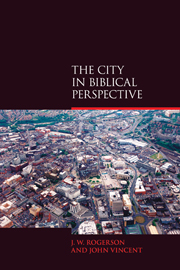Book contents
- Frontmatter
- Contents
- Preface
- Part 1 The city in the Old Testament
- Introduction
- Chapter 1 The Israelite City: History and Archaeology
- Chapter 2 The Israelite City: Biblical Perspectives
- Chapter 3 Making Connections
- Bibliography
- Part 2 The City in the New Testament
- Epilogue
- Bibliography
- Index of Biblical References
- Author Index
- Subject Index
Chapter 3 - Making Connections
from Part 1 - The city in the Old Testament
- Frontmatter
- Contents
- Preface
- Part 1 The city in the Old Testament
- Introduction
- Chapter 1 The Israelite City: History and Archaeology
- Chapter 2 The Israelite City: Biblical Perspectives
- Chapter 3 Making Connections
- Bibliography
- Part 2 The City in the New Testament
- Epilogue
- Bibliography
- Index of Biblical References
- Author Index
- Subject Index
Summary
In his Minima Moralia T. W. Adorno wrote as follows:
There is nothing innocuous left. The little pleasures, expressions of life that seemed exempt from the responsibility of thought, not only have an element of defiant silliness, of callous refusal to see, but directly serve their diametrical opposite. Even the blossoming tree lies the moment its bloom is seen without the shadow of terror; even the innocent “How lovely!” becomes an excuse for an existence outrageously unlovely, and there is no longer beauty or consolation except in the gaze falling on horror, withstanding it, and in unalleviated consciousness of negativity holding fast to the possibility of what is better.
(Adorno, 1997: 26; E.T.: 25)What Adorno meant by this is that humans spend much of their time deceiving themselves about the true nature of the world in which they live. The tree loaded with blossom in spring can help to perpetuate this self-delusion if it engenders a feeling that all is well with the world, whereas the reality is that the blossoming tree is part of a world characterized as much by terror and evil as by beautiful phenomena of nature. According to Adorno the only way to appreciate or conceive of beauty in today's world is to look its terrors and evils in the face and to imagine what the world might be like if they were transformed into something better.
- Type
- Chapter
- Information
- The City in Biblical Perspective , pp. 42 - 43Publisher: Acumen PublishingPrint publication year: 2009



